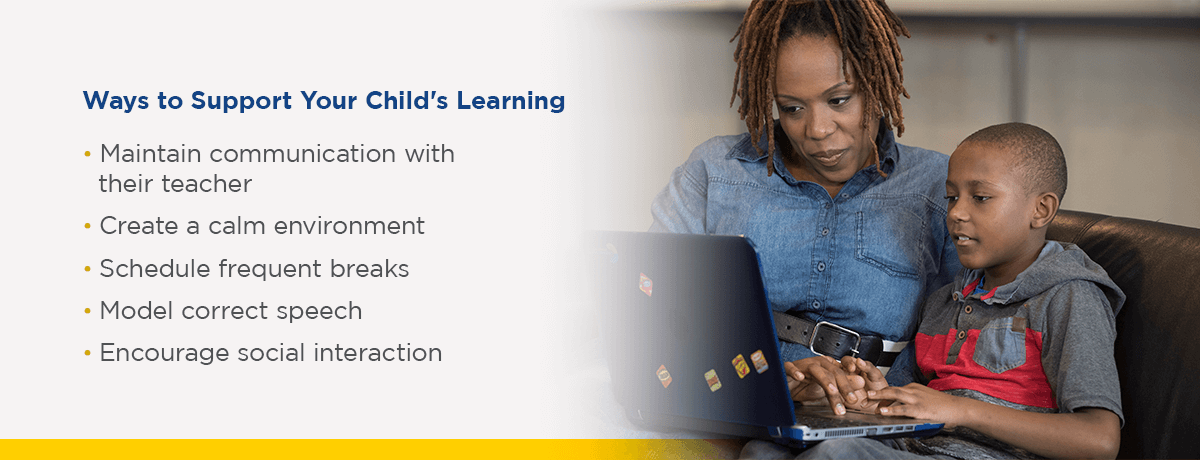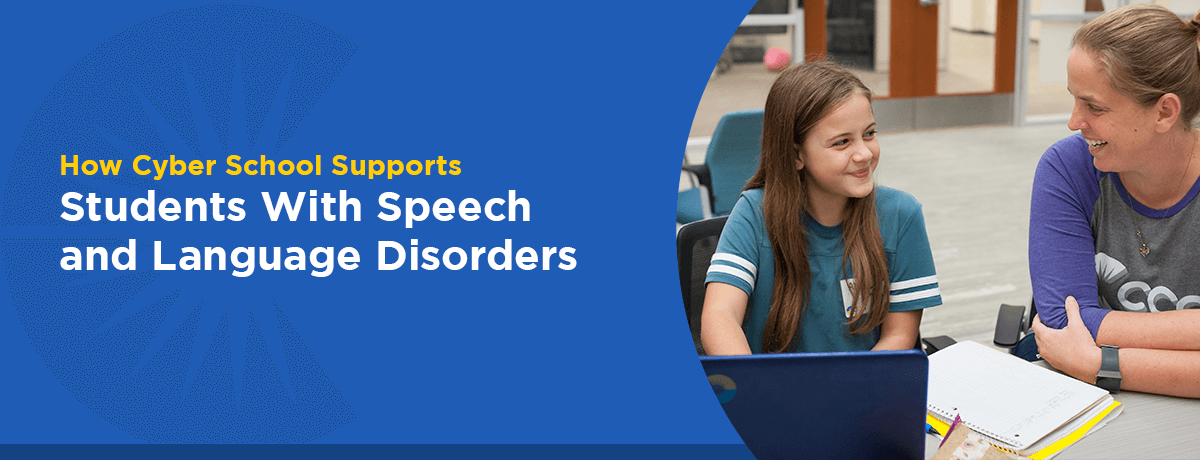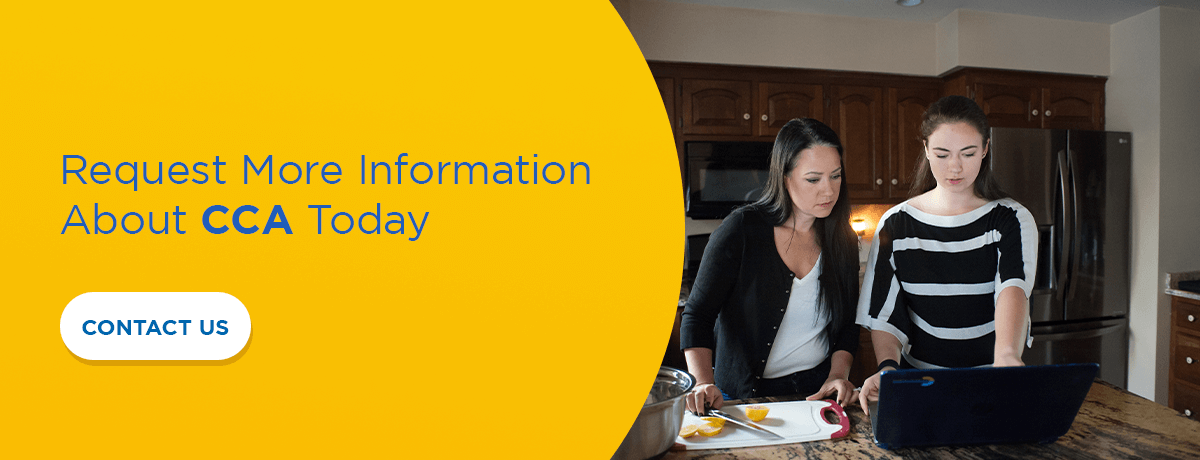Many believe online learning seems like it would be harder on students with speech and language disorders than attending regular school. Yet communication impairments can impact learning at in-person institutions and virtual schools. Fortunately, students who struggle with speech and language disorders can benefit from online learning or cyber schools that support their needs.
Cyberschool allows accommodation for communication disorders and modifications for those learners who need extra help. Public and private schools only plan a certain amount of time for teaching each lesson and working with their students. At Commonwealth Charter Academy (CCA), we provide a supportive online learning environment to help your child succeed.
Speech and Language Disorders in School-Aged Children
Speech and language are not interchangeable, though many confuse the two terms. Speech is the specific sounds made by the lips, tongue, vocal cords, and other related structures. Language is the act of using words to convey thoughts or ideas into something that others can understand.
It takes years for children to develop these skills throughout their early life. Usually, students start speaking within their first year and learn how to develop simple sentences by kindergarten. Children struggling with language and speech disorders require additional time and support to develop these skills. It can be difficult to diagnose a specific disorder at first.
Speech Disorders
Here are some common speech disorders that your child may be experiencing:
- Childhood Apraxia of Speech (CAS): Typically, our brain tells our mouths when to move so we can say what we need to say. For children with CAS, a child knows what they need or want to say, but their muscles won’t let them communicate.
- Dysarthria: The body uses many muscles when talking. Dysarthria is when the facial muscles aren’t strong enough to talk as needed. Usually, this is a result of brain damage.
- Orofacial myofunctional disorders (OMDs): This disorder can also affect teenagers and adults. OMDs interfere with the growth and development of bones and muscles in the face and mouth and affect the way you talk and breathe.
- Speech sound disorder: It will take a while for children to learn certain difficult sounds, like “z” or “th.” If your child isn’t hitting the milestones for each learning set, like confusing or leaving out sounds, they could have a speech sound disorder.
- Stuttering: Most people, especially children, will stutter every so often when trying to talk, but some children struggle with stuttering regularly. Stuttering can be a result of family history or brain differences. There are some strategies and exercises that can help with stuttering.
Language Disorders
The following language disorders are also common in children:
- Receptive and expressive language disorders: These disorders are typical in children aged 3-5, who have difficulty understanding others or communicating with speech. Some children may experience both disorders at the same time.
- Learning disabilities (LD): Learning disabilities usually affect a child’s reading, writing, and spelling abilities. They may also have difficulty with math or social skills. LD is usually due to a brain disorder, and most children have them from the time they’re born.
- Selective Mutism: Children with this disorder are usually social around family and friends, but not at school. They are selective about talking conditions, including when and where they speak. This usually starts once children begin school, but it can sometimes occur in the earlier years.
Examples of Cyber School Modifications for Students with Speech and Language Disorders
Simple changes to the classroom environment can give students the support they need to overcome unique learning challenges. Incorporating visual cues, spelling and vocabulary lists and allowing more time for oral presentations and submissions are common accommodations for these students.
Cyber school’s flexibility enables teachers to help students with speech disorders by using the following strategies:
- Teachers speak directly to the learner.
- Instructors act as good speech models for the student.
- Students can participate in-class participation.
- Students receive praise when they can accomplish something without assistance.
- Educators provide alternative procedures.
- Instructors can consult a speech-language pathologist (SLP) on lessons and activities for each speech disorder student.
Students with language disorders can also receive additional help with these classroom modifications:
- Instructors who practice active listening.
- The chance to use their interests in their speech.
- Tools for pairing words with visual cues to understand vocabulary.
- The ability to work at their own pace.
- Encouragement to ask open-ended questions during lessons.
- Studies that focus on only one concept at a time.
- Encouragement to read and write daily.
For both sets of disorders, the two most important things to remember are that these learners need to work at their own pace and receive encouragement.

How Parents and Learning Coaches Can Support Students With Speech and Language Disorders
As a parent, you are your child’s biggest supporter and advocate. By ensuring that your child receives the help they need, you can make a positive impact on their education. CCA’s online curriculum provides the flexibility and customization to help your child thrive. We also encourage parents to play an active role in their child’s education to further accelerate their growth and development.
Here are some ways that parents can help support their child’s learning:
- Maintain communication with their teachers: You understand your child better than anyone. Discussing your child’s unique behaviors and challenges with their teachers will help them create the ideal learning environment.
- Create a calm environment: Learning from the comfort of home helps you eliminate unnecessary distractions to help your child focus. Make sure that your child has a comfortable space in a quiet area of the house to complete their schoolwork.
- Schedule frequent breaks: Children with speech and language disorders exert a lot of energy trying to communicate. Make sure your child has plenty of time to recharge with fun activities and breaks between challenging lessons.
- Model correct speech: Your child’s learning and development can extend beyond class time. Speaking to your child frequently, reading books aloud and modeling correct speech can help them learn new vocabulary outside of school.
- Encourage social interaction: Spending time with other students helps children with speech and language disorders practice their communication and social skills. Encourage your child to participate in school field trips and extracurricular activities for fun language exposure opportunities.
How CCA Accommodates Students with Speech and Language Disorders
At CCA, our approach is different than other schools. Learning is more than studying and retaining information to pass a test. We want to help your child genuinely love learning. Cyberschool, in general, has multiple benefits and accommodations for students with speech and language disorders. Cyberschool:
- Allows the students to work at their own pace.
- Provides a safe space for learning and making mistakes.
- Eliminates distractions.
- Creates routines.
- Accommodates sensory needs.
- Allows time for breaks whenever students may need them.
At CCA, we use multi-faceted schooling approaches throughout the day. We incorporate live classroom sessions, previously-recorded lessons, workbook assignments, and projects. We also offer tutoring sessions for students who may need a little extra help, customized plans for special education and English learners, and accelerated courses for those who want to work ahead.
We have a unique special education program for learners with a speech or language disorder. We want our learners to learn using the techniques and strategies that are best for them. Our goal is to prepare our learners for success, both during school and in their future.
Request More Information About CCA Today
CCA can help your learner succeed. If you’re interested in CCA, you can request more information on our website, enroll online, or give us a call at (844)-590-2864 to talk to a representative today.




